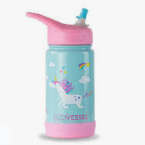Introduction: The production and disposal of plastic water bottles contribute to greenhouse gas emissions, exacerbating the impact of climate change. In this blog, we’ll explore the carbon footprint of plastic water bottles, the role of plastic waste in climate change, and the potential for reducing our environmental impact through sustainable alternatives.
- Carbon Emissions in Plastic Bottle Production: The manufacturing process of plastic water bottles requires significant energy consumption, resulting in the release of greenhouse gases, such as carbon dioxide, into the atmosphere.
- Single-Use Plastic Waste and Landfill Methane: Plastic water bottles that end up in landfills contribute to the emission of methane, a potent greenhouse gas that has a significant impact on global warming.
- Sustainable Alternatives and Carbon Reduction: Choosing sustainable alternatives like reusable water bottles made from stainless steel or glass significantly reduces the carbon footprint associated with hydration practices.
- Recycling as a Mitigation Strategy: Recycling plastic water bottles can help mitigate their environmental impact by reducing the demand for new raw materials and minimizing energy consumption in production.
- Individual Action for Collective Change: By adopting sustainable habits and reducing our reliance on single-use plastic, individuals can collectively contribute to combating climate change and protecting the environment.
Conclusion: Plastic water bottles play a role in climate change through their carbon emissions and contribution to landfill methane production. Embracing sustainable alternatives and recycling practices presents an opportunity to reduce our carbon footprint and protect the planet from the impacts of climate change. By making conscious choices and advocating for environmental responsibility, we can contribute to a greener and more sustainable future for generations to come.

















